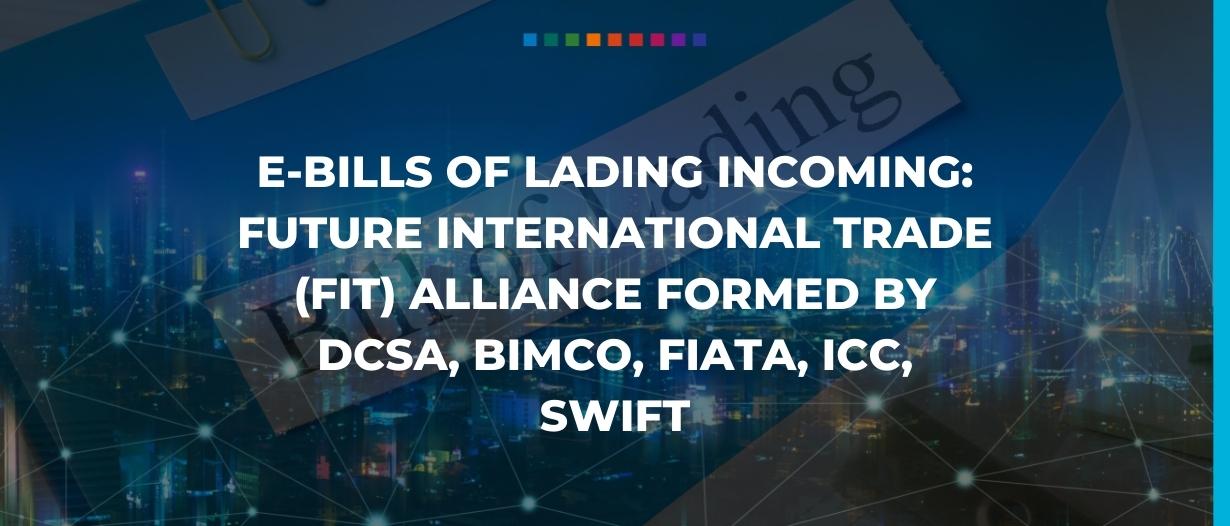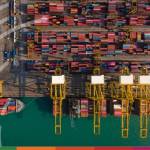A new alliance aimed at standardising electronic bills of lading has been formed by several leading institutions in trade, banking, shipping, and freight forwarding.
Effective as of today, the Digital Container Shipping Association (DCSA) has launched the Future International Trade (FIT) Alliance.
The FIT Alliance is built around a memorandum of understanding (MoU) signed by the DCSA, SWIFT, the International Chamber of Commerce (ICC), the Baltic and International Maritime Council (BIMCO), and the International Federation of Freight Forwarders Associations (FIATA).
As part of the FIT Alliance, each institution will work towards standardisation in the use of electronic bills of lading.
In a press release, the DCSA said the FIT Alliance will work together to facilitate acceptance and adoption of electronic bills of lading by regulators, banks, and insurers.
It will also aim to generate awareness about the importance of common and interoperable data standards and common legislative conditions across international jurisdictions and platforms.
In so doing, the FIT Alliance hopes to unify communication between organisations and customers, physical and contractual carriers, and all other stakeholders involved in an international trade transaction.
DCSA, @BIMCONews, @fiatafederation, @iccwbo, and @swiftcommunity form the FIT Alliance to standardise #Digitalisation of #InternationalTrade.
— Digital Container Shipping Association (DCSA.org) (@DCSA_org) February 15, 2022
Read more : https://t.co/fVvEQ6X5TB
Thomas Bagge, CEO of DCSA, said the FIT Alliance is one of the most exciting outcomes of the industry’s ongoing efforts to produce standardisation through collaboration.
“Container ships carry 90% of the world’s goods. As such, an incredibly diverse set of stakeholders touches the bill of lading transaction – from government regulators, to insurers, to shippers from every industry,” he said.
“To achieve widespread use of e-bills of lading, they must all be on board with adopting digital bill of lading standards.
“The agreement between DCSA and these diverse industry associations is an exciting milestone in our journey towards standardising all container shipping documentation through our eDocumentation initiative.”
Dr. Stephane Graber, director general of FIATA, said that interoperability between all parties in the trade and transport industry is the key foundation to enable smooth data exchange and to streamline the end-to-end shipping process for FIATA members.
“FIATA, as the owner of the only negotiable multimodal transport document, endorsed by UNCTAD and ICC, is convinced that an industry-wide effort to establish open-source, interoperable, technology-agnostic standards is essential to make digitalisation of international trade a reality,” he said.
“FIATA is committed to facilitating adoption of digital processes for freight-forwarders, and we took the lead by developing the electronic FIATA Bill of Lading (eFBL) standard, which will further the acceptance of electronic documents by all stakeholders involved in a bill of lading transaction.”
David Loosley, secretary general and CEO of BIMCO, added that digitalisation of documentation for container shipments will add value for international suppliers who rely on shipping across sectors.
“Aligning these standards with the electronic bill of lading standard for the dry and liquid bulk sectors, which we are developing with assistance from DCSA, will help accelerate the digitalisation of trade globally,” said Loosley.
























